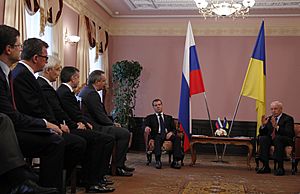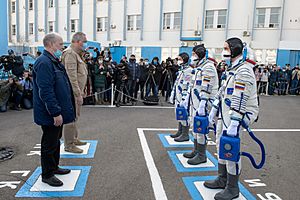Dmitry Rogozin facts for kids
Quick facts for kids
Dmitry Rogozin
|
|
|---|---|
|
Дмитрий Рогозин
|
|
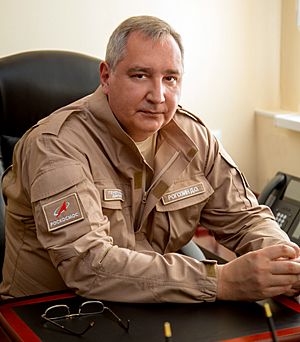
Rogozin in 2020
|
|
| Russian Federation Senator from Russia-occupied Zaporizhzhia Oblast |
|
| Assumed office 23 September 2023 |
|
| Preceded by | Dmitry Vorona |
| General Director of Roscosmos | |
| In office 24 May 2018 – 15 July 2022 |
|
| Preceded by | Igor Komarov |
| Succeeded by | Yury Borisov |
| Deputy Prime Minister of Russia for Defense and Space Industry | |
| In office 23 December 2011 – 18 May 2018 |
|
| Prime Minister | |
| Succeeded by | Yury Borisov |
| Chairman of the State Duma Committee on International Affairs | |
| In office 19 January 2000 – 29 December 2003 |
|
| Preceded by | Vladimir Lukin |
| Succeeded by | Konstantin Kosachyov |
| Member of the State Duma from Voronezh Oblast's Anna constituency | |
| In office 1997–2003 |
|
| Preceded by | Ivan Rybkin |
| Succeeded by | Aleksey Zhuravlyov |
| Personal details | |
| Born |
Dmitry Olegovich Rogozin
21 December 1963 Moscow, Russian SFSR, Soviet Union |
| Political party | United Russia |
| Other political affiliations |
Congress of Russian Communities (1999) |
| Spouse |
Tatyana Gennadyevna Serebriakova
(m. 1983) |
| Children | Alexey Rogozin (b. 1983) |
| Alma mater | Moscow State University |
| Military service | |
| Allegiance | |
| Years of service | 1992 |
| Battles/wars | Transnistria War |
Dmitry Olegovich Rogozin (Russian: Дми́трий Оле́гович Рого́зин; born 21 December 1963) is a Russian politician serving as the senator from the Russian-occupied Zaporozhye Oblast since 23 September 2023. He previously served as director general of Roscosmos from 2018 to July 2022, as deputy prime minister in charge of the defense industry from 2011 to 2018, and as Russia's ambassador to NATO from 2008 to 2011.
He was co-founder of the far-right Rodina political party, which was created in 2003. Parts of the party later merged with other parties to form A Just Russia in 2006.
Contents
Early life and education
Rogozin was born in Moscow to the family of a Soviet military scientist. He graduated from Moscow State University in 1986 with a degree in journalism, and in 1988 he graduated from the University of Marxism–Leninism under the Moscow City Committee of the CPSU with a degree in economics.
His thesis on "Philosophy and Theory of Wars" earned him a Doctor of Philosophy while a Doctor of Technical Sciences was awarded him in the specialty "weapons theory, military-technical policy, weapons systems". Both were earned while he was professionally engaged in politics.
Political career
Early career
In 1992, Rogozin fought in the Transnistria War against the Moldovan forces as a soldier of a volunteer detachment. In Transnistira, he became acquainted with the general Alexander Lebed. He is a vocal supporter of Transnistria's independence from Moldova.
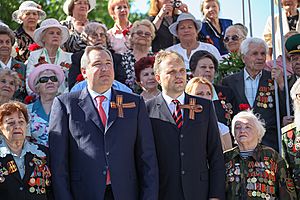
In 1993, Rogozin joined the recently created party Congress of Russian Communities led by General Alexander Lebed and, after its founder died in a 2002 helicopter crash, Rogozin became joint leader with Sergey Glazyev of what became the Rodina party. Rogozin was elected to the State Duma as a deputy from Voronezh Oblast in 1997, and he became a vocal activist for protection of rights of ethnic Russians in the former Soviet republics.
Rogozin was re-elected to the State Duma in 1999 and then appointed the Chairman of the Foreign Affairs Committee, drawing a lot of media attention and a share of criticism for some of his flamboyant public remarks. In 2002, he was appointed a Special Representative of the Russian President to deal with Kaliningrad problems that arose by the Baltic states joining the European Union. Rogozin received an official letter of gratitude from Russian President Vladimir Putin.
In 2003, Rogozin became one of the leaders of the Rodina (Motherland) "national-patriotic" coalition, which won 9.2% of the popular vote or 37 of the 450 seats in the Duma in the 2003 parliamentary election, briefly propelling him to the post of the Duma's vice-speaker, from which he was dismissed a year and a half later as a result of some elaborate interfaction dealings. He remained an ordinary member of the Duma until the following election, in 2007.
After the breakthrough in the 2003 elections, Rogozin became involved in a power struggle with Rodina's other co-chairman, Glazyev, who had socialist views. Glazyev nominated himself as the party's candidate in the 2004 presidential election, but Rogozin called on his party comrades to support incumbent Putin. Rogozin soon ousted Glazyev, to become the party's sole leader.
Under Rogozin, Rodina shifted towards the right wing of Russian politics and became the second largest and one of the country's most successful parties. In early 2006, at Rodina's congress, Rogozin resigned as party leader. Rogozin left Rodina after its merger with the Russian Party of Life and the Pensioners' Party into Fair Russia. In November 2006, he was the Chairman of the revived Congress of Russian Communities. In April 2007, he announced that he might support the formation of the Great Russia Party, in conjunction with the Movement Against Illegal Immigration. The party said that it might consider supporting the candidacy of Belarusian President Alexander Lukashenko for the Presidency of Russia in 2008, a move that was unconstitutional because Lukashenko is not a Russian citizen. Because Russian authorities had not registered Great Russia, the party could not contest the legislative election in 2007.
Ambassador to NATO
In 2008, Rogozin was appointed by the Medvedev–Putin duumvirate as the Russian ambassador to NATO. As Russia's NATO envoy, he was heavily opposed to Ukraine and Georgia becoming members of NATO. .
On 18 February 2011, Russian President Dmitry Medvedev appointed Rogozin as the Special Representative on anti-missile defense; he negotiated with NATO countries on this issue.
Deputy Prime Minister
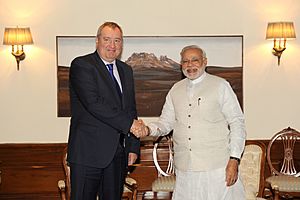
On 23 December 2011, Rogozin was appointed as Putin's Deputy Prime Minister in charge of the defense and space industries. For the defense industry, he led the creation of the Russian Foundation for Advanced Research Projects in the Defense Industry.
Head of Roscosmos
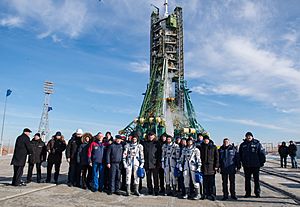
In May 2018, Putin selected Rogozin to be the head of Roscosmos, the Russian state space agency for two decades after the early 1990s and, in the past few years, transformed by Rogozin from a state agency into a state corporation.
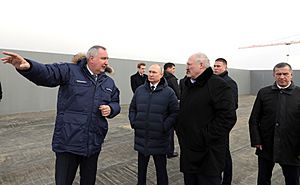
After Roscosmos
On 23 September 2023, the governor of Russian-occupied Zaporozhye Oblast Yevgeny Balitsky appointed Rogozin as an aspirational senator from Zaporozhye Oblast. Following his appointment, Rogozin stated that it is an "honor for me to defend the interests of the Zaporozhye Oblast and Novorossiya as a whole".
See also
 In Spanish: Dmitri Rogozin para niños
In Spanish: Dmitri Rogozin para niños


